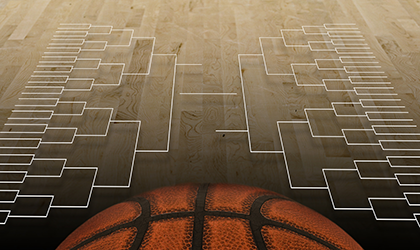
The college basketball tournament bracket pool is a cultural phenomenon in the United States. Each year, almost 25 million people bet on their ability to predict the outcome of every game in the NCAA “March Madness” tournament, in small-stakes office betting pools.
The inventors of the bracket pool wanted a game that would “determine once and for all who knew the most about college basketball”, as Tim Trowbridge put it. But after a few years, the nationwide running joke was that the office bracket pool winner was that person in the office who knew the least about college basketball.
Most people probably attribute this phenomenon solely to the uncertainty of the tournament outcome. But there is evidence supporting the existence of a cause-and-effect relationship between too much basketball knowledge and suboptimal bracket pool play.
How it works
March Madness consists of four 16-team regional tournaments similar to the knockout stage of the soccer World Cup. Teams are seeded from 1 to 16 in the regional tournaments in order of strength. The regional winners play two knockout rounds to determine the national champion.
Before the tournament, bettors fill out their tournament “bracket” – a tree diagram showing each game and its predicted winner – and submit it to their office pool manager. After the tournament, the brackets are scored and the bettors with the highest-scoring brackets win the pot. The most common scoring systems award more points for correct picks in later rounds. Some pools award bonus points for correctly picking lower-seeded (weaker) teams.
The cost of knowledge
Psychologist Tina Kiesler and her research team1 found that there was an inverted-U curve relationship between performance on a 25-question basketball knowledge exam and performance on picking game winners in the NCAA tournament. This inverted-U curve, depicted conceptually in Figure 1, appears to mirror the frown of a basketball expert peering at it. The most knowledgeable subjects were actually the worst pickers of all. This team of researchers found the same general pattern among subjects predicting outcomes in other sports, and they cited studies showing that experts perform no better than novices in some other domains.

FIGURE 1 The inverted-U curve relationship between March Madness pick accuracy and basketball knowledge.
How could this be? It turns out that prediction is a skill all its own, somewhat independent of the knowledge you possess on the matter being predicted. The best forecasters tend to give a lot of weight to base rates (i.e., past team performance). Kiesler’s team reported that: “More knowledgeable subjects did not perform as well in this task because they too often relied on their own specific basketball knowledge and did not utilize base rates as often as they should.” The researchers had evidence of this because they asked the subjects to provide reasons for their predictions.
Halberstadt and Levine2 tested the accuracy of self-identified basketball experts at predicting the outcome of the eight games played in the Sweet Sixteen round of the NCAA men’s tournament for the years 1995 and 1996. The subjects were assigned to one of two groups. One group, the “reasoning group”, was instructed to think about, analyze, and list the reasons for their predictions. The subjects were asked to list three reasons for each game. The other group, the “nonreasoning group”, was instructed to use intuition or gut feelings, not think about the reasons for their predictions, and avoid drawn-out analysis. The pick accuracy of the nonreasoning group (70.4%) was significantly better than that of the reasoning group (65.2%). Both groups underperformed the pick accuracy of the betting market spreads (78.1%).
Halberstadt and Levine provided a couple of theories as to why analyzing the reasons for a pick might degrade accuracy. First, reasoning might bring more specific knowledge to mind, thereby making specific knowledge more likely to inappropriately override the base rates. Second, basketball experts might have better automatic prediction skills. The skill of picking the best team might be like riding a bicycle. If you are already relatively skilled at predicting basketball games, then too much thinking about it might make you worse.
The importance of statistical reasoning
The bracket pool is a game about a game. The basketball fans who invented the bracket pool overrated the importance of basketball knowledge in bracket pool play. And they did not realize the importance of specific strategies for the bracket pool itself, independent of basketball. These strategies must be used to determine when it’s favorable to pick the weaker team to win a tournament game. Basketball knowledge (knowing the win probability of the weaker team) is only one factor in deciding which upsets to pick. Estimating this probability and weighing other factors important in bracket pool strategy require statistical reasoning.
Most bettors over-back the favorites for champ and pick too many upsets in early rounds. In pools without upset bonuses, a bracket based on sound statistical reasoning will typically pick a mild upset for champ while picking favorites to win most or all other games.
With almost 40 years of perspective on the bracket pool, it is perhaps more valid to say that the bracket pool determines not who knows the most about basketball but who knows the most about statistical reasoning.
About the author
Tom Adams’ work presenting bracket improvement methods has been featured in the New York Times, Sports Illustrated, and SmartMoney magazine. This article is adapted from his new book, Improving Your NCAA Bracket with Statistics.3
References
- Kiesler, T., V. G. Morwitz, and E.A. Yorkston. 2001. The Ball Bounces Differently for Experts and Novices. Paper presented at the Association for Consumer Research European Conference (June 2001). ^
- Halberstadt, J. B. and G. M. Levine. 1999. Effects of Reasons Analysis on the Accuracy of Predicting Basketball Games. Journal of Applied Social Psychology 29:517–530. ^
- Adams, T. 2019. Improving Your NCAA Bracket with Statistics. Boca Raton: CRC Press. ^




